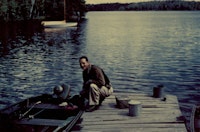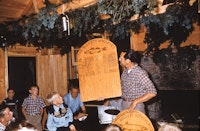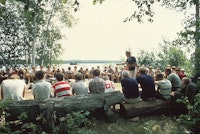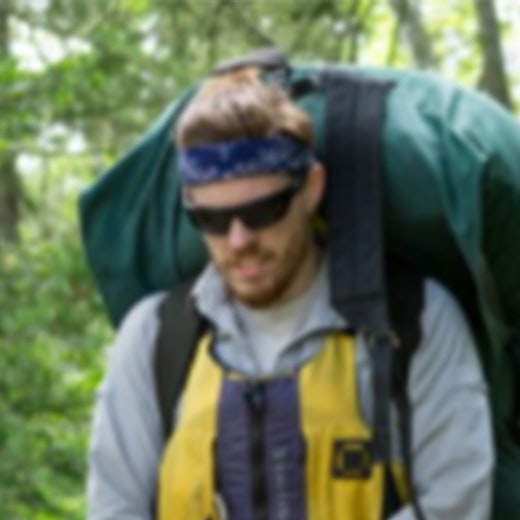
There are leaders, and there are those who lead. Leaders hold a position of power or authority, but those who lead inspire us. We follow those who lead not because we have to, but because we want to. We follow those who lead not for them, but for ourselves. And it’s because we want to that we let them influence us and those around us.
Though I never met the founder of Camp Voyageur in person, I've seen glimpses of his life and leadership in this place we seem to seasonally gravitate towards. It radiates from the leadership that continues to run camp. It erupts in laughter from the quirky, rowdy traditions that kids and adults alike lose themselves in. It grows in each of us as we venture into the kingdom of moon rises and loon songs, into a place where silence is loud and you can practically hear the thoughts of your bowman as you paddle across Lac la Croix.
The impact this place has on an individual is profound. If soccer camp is supposed to make you better at soccer player, then Camp Voyageur is supposed to make you a better person. Sounds nice, but how are you supposed to sell an idea like that to parents that have every right to be skeptical of tuition costs? I've read that an experience like this has been proven to advantage their children with some of the best predictors of success in life, such as resilience, self-actualization, and grit. And yet, there’s some mystique about this place, something that I cannot for the life of me capture adequately with words. Are we really making people better people, or are we making their lives more complete somehow?
I think back. I’d say I had a lot of fun at camp when I was growing up here, but I don’t know… fun just doesn’t do the experience justice, and I would describe my first portage as anything but fun. At that point in my life though, that’s what I assumed any summer camp was for. That’s what I assumed most things were for, except school of course. That’s what our post-industrial economy channels into us as kids, this notion that we should always be enjoying and consuming life. That life should progress in predictable phases, and if you don’t know what you’re supposed to be doing at any given moment, something is wrong. And of course, the word “play” rarely appeared in absence of “videogames.”

Yet this place seemed to buck all of these things and then some. Aside from knowing I would get three meals per day, I rarely knew what I was going to do. I had to think about what I wanted, what sounded interesting to me. That even meant choosing the activity I least hated sometimes. And gradually, I began to not hate those activities. In fact, it wasn’t even about what we were doing but who was leading each activity. You were drawn towards these 20-somethings that clearly weren’t experienced leaders, but commanded your attention. Their laughter became your laughter. Their energy became your energy.
Then life does one of those things where all of a sudden, you’re an adult. You’re a 20-something slowly starting to assume responsibility of your own life, and now you’re going to be leading groups of preteens and teens into the wilderness, responsible for feeding them, making sure they stay warm, and keeping them going on their first portage. But even though we have these immense responsibilities, it feels strange to picture ourselves as counselors, guides, or teachers. That’s just not the group dynamic here at camp. The campers seem more like fellow travelers helping the group keep moving forward. You start to notice the individual in each of them, and by the end of your trip, everyone seems like a character in some ridiculous cartoon.
Then you finally return to camp. Everyone is louder and somehow more energetic despite clearly being physically drained. Stories of hardship are told with a smile as kids compare bug bites in the midst of a cloud of steam rushing towards your face. Where am I? In the sauna of course. Walking back to your cabin, you hear someone shout through the forest, “hey, how was your trip?!” to which you always reply “great!” even if that portage on your second day was the hardest thing you’d ever done in your life, and you thought about never coming back to camp.
At this point, even the most quiet and shy kid in camp would be considered outgoing and talkative to anyone just passing by. It’s as if your personality has been somehow refreshed. As you start to recall moments from your trip to your friends, you can better remember your bowman than the environment you were paddling through. How ironic that we paddle into this beautiful, uninhabited landscape only to feel more in touch with your humanity than your surroundings.
And I can’t help but believe that this was Charlie’s vision. This is what he saw in a cloudscape silhouetted only by the great pines and towering aspens. He saw in the forest a way for people to be better people, to be more complete. That there was some human need to experience more than a sense of belonging to your family, but to complete strangers. That hardship made us remember something modern society has lost, something we depended on when we still traveled in packs across a terrain embattled by the elements. It made us remember our sense of brotherhood, a terribly confusing and contradictory sense of being a part of something larger than yourself while seeing the individuality and uniqueness of each human life.

Whether or not that was his vision, I’ll never know. But whatever his vision was, it must have been something to behold. To have motivated someone to take what was a very precarious amount of fiscal value to his namesake and what little time he had left after raising a family, coaching and teaching to build this place called Camp Voyageur. To have molded himself into the kind of person camp needed to function. To have inspired those around him to be a part of and carry on what he started. It must have been lofty and unwieldy to carry through the obstacle course of skepticism, setbacks and occasional failures that plague this plain of existence.
A friend of mine observed recently that “everyone at camp just seems to have a certain passion about them.” It kind of grounded me a little, because it reminded me that the way camp operates is anything but normal. It’s a collection of passion playing to the strengths of the individuals within it. The program is the passion of the staff. And what guides this passion? What fosters it and brings our personalities out of the woodworks? Camp has its share of leaders but I would be remiss to say any one person actively guides it. Surely then, this is where you can feel Charlie’s presence and where I sit trying to piece together the reason this place exists.
It was his vision, and now it is ours, to share with as many people as possible. To keep kids dreaming. To show them not what they can become, but what they can do for themselves and for each other. To experience brotherhood. To feel the needs of others. To depart from a world that pushes and pulls them for a world where the only force that moves them forwards is themselves. To experience hardship, setbacks, and failure, and to continue because you have to. Because life is simpler here, but that doesn’t mean it is easier. Because you have to finish that portage. You have to participate. You have to succeed. You have to think for yourself. And there, “in the mists over the meadows, the sunlight on the leaves, the path of the moon over water,” that is where you find another version of yourself. It is that which you can become, a freedom almost forgotten.




